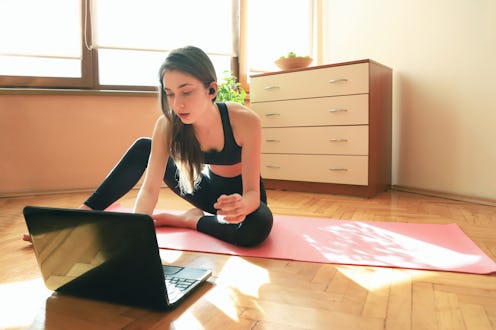Life
How To Exercise At Home When You Don’t Want Your Roommates To Judge You

This piece is part of Bustle’s All Levels Welcome, a column about making fitness culture as accessible and inclusive as possible.
Pre-pandemic, you'd never actually had a full conversation with your roommate. Now that you're quarantining together, it turns out they're perfectly lovely, but your face still turns bright red at the idea of livestreaming a kickboxing class while they're in the kitchen. It can feel embarrassing to work out in front of your roommate, but that doesn't mean all exercise hope is lost.
"This is new territory we are embarking on," says Alex Carneiro, a certified personal trainer and athlete for Team Optimum Nutrition, a sports nutrition company. "We’re all feeling discomfort in this new space. More than likely, your roommate is not judging you. That said, it’s totally normal, and healthy, to carve out your own space."
Carneiro tells Bustle that actually talking to each other is key. "Communicate with them that you are nervous to start this new fitness routine and ask if you could have 15-30 minutes to yourself," he advises. Maybe there are particular times of day that your housemate tends to hole up in their room and watch She-Ra, and that's when you can get the living room to yourself. Or maybe you stick to your own area and do all the bodyweight squats and small-space bedroom workouts you can think of, because breaking a sweat in a common space just isn't something you're willing to do right now.
You can also team up with your quarantine pal and be awkward together. "Ask your roommate if they have a home workout they’d be interested in trying, so that you two can do it together," says David Robertson, a certified trainer and instructor at CycleBar River North, an indoor cycling studio. "There is likely some area of fitness in which you are both beginners (maybe it’s yoga, dance, or Pilates). Trying a new workout together could bring you closer and will hopefully eradicate some of those feelings of insecurity because you’re both in the same boat as newbies."
Whatever your strategy, Carneiro suggests starting slow. "If you are worried about your roommate judging you and don’t feel confident in your new workouts, start with five to eight minutes a day to gradually get accustomed to working out with somebody else in the room."
Part of getting comfortable with doing Pilates in front of your roomie is feeling more competent at the moves you're going to try, Carneiro tells Bustle. "A huge factor of feeling self-conscious is, essentially, not knowing what you are doing," he says. "You think you are being silly, but I promise that is never the case." He recommends trying bodyweight exercises that won't need resistance bands or workout equipment.
If you're using YouTube as your guide, you might want to just sit and check out the exercises first. Before you dive into down dog, watch and listen to the video so you can start processing the coordination you'll need for the yoga you're about to do. Is the instructor clear about when you should be reaching with your left arm versus your right? When they tell you to sink into a curtsy lunge, will you actually know what they mean? Watching the video beforehand will give you an idea of the pace, instruction style, and moves, so you'll feel more confident when you actually stand up and follow along physically.
It's not just the moves that might worry you, though. "Beyond technique and fitness level, many people are [self-conscious] about their physical appearance in general while exercising, whether it’s because of excessive sweating, redness in the face, or the way athletic wear fits them," Robertson says. Consider treating yourself so that working out at home feels like an indulgence rather than a chore. "Change your environment to feel more empowered," Carneiro advises. "For example, get new workout clothes that you feel great in and set up a playlist to keep you motivated."
Even when you're as prepared as can be, your anxiety brain might still think your roomie is making fun of you rather than laughing at TikTok. Try to be gentle with yourself about your fears. Moving your body in new ways is an intimate and vulnerable experience, and you don't have to shame yourself for feeling the way you do.
"It’s important to acknowledge that you are embarrassed," Carneiro says. "Often, we avoid thoughts that bring us down and create discomfort, but acknowledging this feeling will help us get to the root of the problem and allow us to move forward with our goals and overcome embarrassment. Remember, this is a time we’re all feeling discomfort at some level. And that’s normal."
Experts:
Alex Carneiro, certified personal trainer and athlete for Team Optimum Nutrition
David Robertson, certified trainer and instructor at CycleBar River North
This article was originally published on